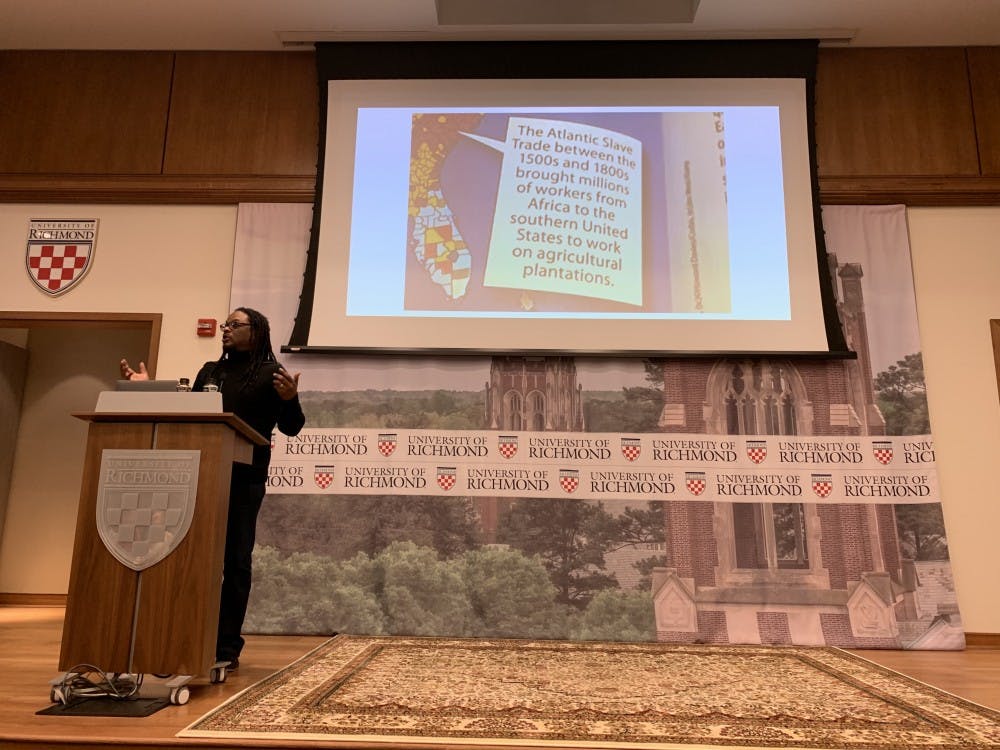Best-selling author Lawrence Ross gave a lecture focused on topics from his most recent book, “Blackballed: The Black and White Politics of Race on America's Campuses,” which speaks to issues of campus racism, past and present.
Ross' book "The Divine Nine: The History of African American Fraternities and Sororities" was a Los Angeles Times bestseller.
Ross, who spoke at the Queally Center, walked onstage Tuesday night reciting a racist chant that chapter members of fraternity Sigma Alpha Epsilon at the University of Oklahoma were recorded chanting in 2015. He spoke of another chant that came from fraternity Tau Kappa Epsilon in 1963 at California State University, Long Beach. Both chants included racial slurs and spoke of hanging and bombing African Americans.
“Are these just isolated incidents?" Ross asked. "Or is this something systemic that we never want to talk about?”
He went on to answer these questions as he spoke about several instances when students on college campuses, particularly those who were part of the Interfraternity Council and National Panhellenic Conference, sent photos with blackface, harassed black students, wrote offensive messages and physically attacked students of color.
Ross highlighted multiple incidents from the University of Oklahoma, the University of Tennessee, Arizona State University, the University of Georgia and others.
He also touched on the University of Richmond’s faults.
"It was only 50 years ago that the University of Richmond had the first African American to be accepted,” Ross said.
Ross also discussed the racist photo published on the Sigma Alpha Epsilon spread in the 1980 edition of UR's yearbook, "The Web."
In his lecture, Ross predominantly focused on Greek life communities on college campuses.
“We have to talk about race and racism on college campuses," Ross said, "because one of the problems is when we talk about overt racism on college campuses, they typically come from IFC and Panhellenic.”
After asking the members of fraternities in the crowd to raise their hands, Ross said that white supremacists were not dressing like Ku Klux Klan members or Nazi members anymore, but were “dressing like every single fraternity man on the face of this earth. ... What they want to do is to blend into your organization.”
Enjoy what you're reading?
Signup for our newsletter
Ross used a quote from the Rev. Martin Luther King Jr. – “Nothing in all the world is more dangerous than sincere ignorance and conscientious stupidity" – to illustrate problems faced today.
Ross said: “The sincere ignorance that we see on a regular basis coming from IFC and Panhellenic are the things we should've gotten rid of over and over if we had been doing the work within our organizations. Conscientious stupidity are the people who say, 'I just didn’t know. I thought it was a joke.'”
Nabeel Siddiqui and Jon Messer, the two academic technology consultants who brought Ross to campus, did so to encourage discussion on campus and help the campus community take action, Siddiqui said. The Center for Teaching, Learning and Technology, the faculty senate and the Office of the President sponsored Ross' appearance.
Siddiqui said he had hoped that Ross’ presentation and the other talks they had coordinated around campus would spur change on a systemic level.
“Ross helped a lot of our faculty and students and the administration to ask ourselves about who we are as a community,” Siddiqui said.
Junior Lindsey Paul, who attended the lecture, wrote in an email that the talk had been phenomenal and engaging, especially for what she said was a difficult and often uncomfortable conversation.
"As a member of WCGA [Westhampton College Government Association], I found his discussion about what students can do to combat racism on campus to be extremely informative," Paul wrote. "Knowing history about racism on college campuses is important in being able to push for a more inclusive campus in the future."
Although she wished more students had been present at the lecture, Paul was hopeful that Ross' talk would spark more student-led conversation and anti-racism action moving forward, she wrote.
Ross ended his lecture by saying that there needed to be change, and addressing what students nationwide and on the UR campus could do. He reminded the audience that racial justice did not require them to have melanin in their skin.
Ross asked people to humble themselves and to empathize with people who are different from them because, he said, people need to get out of their comfort zone when it comes to racism, to speak up and stand up.
Ross said he believed that every student, particularly every student of color, should come off the UR campus feeling that they belong.
“If you’re not doing everything you can to deconstruct the things on this campus at the University of Richmond, or other campuses, then you are contributing to the things that will end up killing people," Ross said, "whether in a tragic situation or if it's something that kills a person in terms of their spirit or kills a person mentally or kills their education."
Ross believes that once UR students work every day to create a community where everyone feels welcomed and leaves with that same feeling, the university "will actually reach its values and mandates, and will produce the type of students that we all want," he said.
Contact news writer Avery Wasson at avery.wasson@richmond.edu.
Support independent student media
You can make a tax-deductible donation by clicking the button below, which takes you to our secure PayPal account. The page is set up to receive contributions in whatever amount you designate. We look forward to using the money we raise to further our mission of providing honest and accurate information to students, faculty, staff, alumni and others in the general public.
Donate Now



